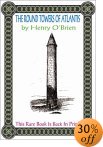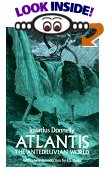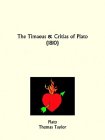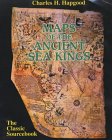|
|
Looking towards the sea, but in the centre of the whole island, there was a plain which is said to have been the fairest of all plains and very fertile. Near the plain again, and also in the centre of the island at a distance of about fifty stadia, there was a mountain not very high on any side. In this mountain there dwelt one of the earth born primeval men of that country, whose name was Evenor, and he had a wife named Leucippe, and they had an only daughter who was called Cleito. The maiden had already reached womanhood, when her father and mother died; Poseidon fell in love with her and had intercourse with her, and breaking the ground, inclosed the hill in which she dwelt all round, making alternate zones of sea and land larger and smaller, encircling one another; there were two of land and three of water, which he turned as with a lathe, each having its circumference equidistant every way from the centre, so that no man could get to the island, for ships and voyages were not as yet. He himself, being a god, found no difficulty in making special arrangements for the centre island, bringing up two springs of water from beneath the earth, one of warm water and the other of cold, and making every variety of food to spring up abundantly from the soil. He also begat and brought up five pairs of twin male children; and dividing the island of Atlantis into ten portions, he gave to the first-born of the eldest pair his mother’s dwelling and the surrounding allotment, which was the largest and best, and made him king over the rest; the others he made princes, and gave them rule over many men, and a large territory. And he named them all; the eldest, who was the first king, he named Atlas, and after him the whole island and the ocean were called Atlantic. To his twin brother, who was born after him, and obtained as his lot the extremity of the island towards the Pillars of Heracles, facing the country which is now called the region of Gades in that part of the world, he gave the name which in the Hellenic language is Eumelus, in the language of the country which is named after him, Gadeirus. Of the second pair of twins he called one Ampheres, and the other Evaemon. To the elder of the third pair of twins he gave the name Mneseus, and Autochthon to the one who followed him. Of the fourth pair of twins he called the elder Elasippus, and the younger Mestor. And of the fifth pair he gave to the elder the name of Azaes, and to the younger that of Diaprepes. All these and their descendants for many generations were the inhabitants and rulers of divers islands in the open sea; and also, as has been already said, they held sway in our direction over the country within the Pillars as far as Egypt and Tyrrhenia. Now Atlas had a numerous and honourable family, and they retained the kingdom, the eldest son handing it on to his eldest for many generations; and they had such an amount of wealth as was never before possessed by kings and potentates, and is not likely ever to be again, and they were furnished with everything which they needed, both in the city and country. For because of the greatness of their empire many things were brought to them from foreign countries, and the island itself provided most of what was required by them for the uses of life. In the first place, they dug out of the earth whatever was to be found there, solid as well as fusile, and that which is now only a name and was then something more than a name, orichalcum, was dug out of the earth in many parts of the island, being more precious in those days than anything except gold.There was an abundance of wood for carpenter’s work, and sufficient maintenance for tame and wild animals. Moreover, there were a great number of elephants in the island; for as there was provision for all other sorts of animals, both for those which live in lakes and marshes and rivers, and also for those which live in mountains and on plains, so there was for the animal which is the largest and most voracious of all. Also whatever fragrant things there now are in the earth, whether roots, or herbage, or woods, or essences which distil from fruit and flower, grew and thrived in that land; also the fruit which admits of cultivation, both the dry sort, which is given us for nourishment and any other which we use for food we call them all by the common name pulse, and the fruits having a hard rind, affording drinks and meats and ointments, and good store of chestnuts and the like, which furnish pleasure and amusement, and are fruits which spoil with keeping, and the pleasant kinds of dessert, with which we console ourselves after dinner, when we are tired of eating-all these that sacred island which then beheld the light of the sun, brought forth fair and wondrous and in infinite abundance. With such blessings the earth freely furnished them; meanwhile they went on constructing their temples and palaces and harbours and docks. And they arranged the whole country in the following manner: First of all they bridged over the zones of sea which surrounded the ancient metropolis, making a road to and from the royal palace. And at the very beginning they built the palace in the habitation of the god and of their ancestors, which they continued to ornament in successive generations, every king surpassing the one who went before him to the utmost of his power, until they made the building a marvel to behold for size and for beauty. And beginning from the sea they bored a canal of three hundred feet in width and one hundred feet in depth and fifty stadia in length, which they carried through to the outermost zone, making a passage from the sea up to this, which became a harbour, and leaving an opening sufficient to enable the largest vessels to find ingress. Moreover, they divided at the bridges the zones of land which parted the zones of sea, leaving room for a single trireme to pass out of one zone into another, and they covered over the channels so as to leave a way underneath for the ships; for the banks were raised considerably above the water. Now the largest of the zones into which a passage was cut from the sea was three stadia in breadth, and the zone of land which came next of equal breadth; but the next two zones, the one of water, the other of land, were two stadia, and the one which surrounded the central island was a stadium only in width. The island in which the palace was situated had a diameter of five stadia. All this including the zones and the bridge, which was the sixth part of a stadium in width, they surrounded by a stone wall on every side, placing towers and gates on the bridges where the sea passed in. The stone which was used in the work they quarried from underneath the centre island, and from underneath the zones, on the outer as well as the inner side. One kind was white, another black, and a third red, and as they quarried, they at the same time hollowed out double docks, having roofs formed out of the native rock. Some of their buildings were simple, but in others they put together different stones, varying the colour to please the eye, and to be a natural source of delight. The entire circuit of the wall, which went round the outermost zone, they covered with a coating of brass, and the circuit of the next wall they coated with tin, and the third, which encompassed the citadel, flashed with the red light of orichalcum. The palaces in the interior of the citadel were constructed on this wise: in the centre was a holy temple dedicated to Cleito and Poseidon, which remained inaccessible, and was surrounded by an enclosure of gold; this was the spot where the family of the ten princes first saw the light, and thither the people annually brought the fruits of the earth in their season from all the ten portions, to be an offering to each of the ten. Here was Poseidon’s own temple which was a stadium in length, and half a stadium in width, and of a proportionate height, having a strange barbaric appearance. All the outside of the temple, with the exception of the pinnacles, they covered with silver, and the pinnacles with gold. In the interior of the temple the roof was of ivory, curiously wrought everywhere with gold and silver and orichalcum; and all the other parts, the walls and pillars and floor, they coated with orichalcum. In the temple they placed statues of gold: there was the god himself standing in a chariot-the charioteer of six winged horses-and of such a size that he touched the roof of the building with his head; around him there were a hundred Nereids riding on dolphins, for such was thought to be the number of them by the men of those days. There were also in the interior of the temple other images which had been dedicated by private persons. And around the temple on the outside were placed statues of gold of all the descendants of the ten kings and of their wives, and there were many other great offerings of kings and of private persons, coming both from the city itself and from the foreign cities over which they held sway. There was an altar too, which in size and workmanship corresponded to this magnificence, and the palaces, in like manner, answered to the greatness of the kingdom and the glory of the temple. In the next place, they had fountains, one of cold and another of hot water, in gracious plenty flowing; and they were wonderfully adapted for use by reason of the pleasantness and excellence of their waters. They constructed buildings about them and planted suitable trees, also they made cisterns, some open to the heavens, others roofed over, to be used in winter as warm baths; there were the kings’ baths, and the baths of private persons, which were kept apart; and there were separate baths for women, and for horses and cattle, and to each of them they gave as much adornment as was suitable. Of the water which ran off they carried some to the grove of Poseidon, where were growing all manner of trees of wonderful height and beauty, owing to the excellence of the soil, while the remainder was conveyed by aqueducts along the bridges to the outer circles; and there were many temples built and dedicated to many gods; also gardens and places of exercise, some for men, and others for horses in both of the two islands formed by the zones; and in the centre of the larger of the two there was set apart a race-course of a stadium in width, and in length allowed to extend all round the island, for horses to race in. Also there were guardhouses at intervals for the guards, the more trusted of whom were appointed-to keep watch in the lesser zone, which was nearer the Acropolis while the most trusted of all had houses given them within the citadel, near the persons of the kings. The docks were full of triremes and naval stores, and all things were quite ready for use. Enough of the plan of the royal palace. Leaving the palace and passing out across the three you came to a wall which began at the sea and went all round: this was everywhere distant fifty stadia from the largest zone or harbour, and enclosed the whole, the ends meeting at the mouth of the channel which led to the sea. The entire area was densely crowded with habitations; and the canal and the largest of the harbours were full of vessels and merchants coming from all parts, who, from their numbers, kept up a multitudinous sound of human voices, and din and clatter of all sorts night and day. I have described the city and the environs of the ancient palace nearly in the words of Solon, and now I must endeavour to represent the nature and arrangement of the rest of the land. The whole country was said by him to be very lofty and precipitous on the side of the sea, but the country immediately about and surrounding the city was a level plain, itself surrounded by mountains which descended towards the sea; it was smooth and even, and of an oblong shape, extending in one direction three thousand stadia, but across the centre inland it was two thousand stadia. This part of the island looked towards the south, and was sheltered from the north. The surrounding mountains were celebrated for their number and size and beauty, far beyond any which still exist, having in them also many wealthy villages of country folk, and rivers, and lakes, and meadows supplying food enough for every animal, wild or tame, and much wood of various sorts, abundant for each and every kind of work. I will now describe the plain, as it was fashioned by nature and by the labours of many generations of kings through long ages. It was for the most part rectangular and oblong, and where falling out of the straight line followed the circular ditch. The depth, and width, and length of this ditch were incredible, and gave the impression that a work of such extent, in addition to so many others, could never have been artificial. Nevertheless I must say what I was told. It was excavated to the depth of a hundred, feet, and its breadth was a stadium everywhere; it was carried round the whole of the plain, and was ten thousand stadia in length. It received the streams which came down from the mountains, and winding round the plain and meeting at the city, was there let off into the sea. Further inland, likewise, straight canals of a hundred feet in width were cut from it through the plain, and again let off into the ditch leading to the sea: these canals were at intervals of a hundred stadia, and by them they brought down the wood from the mountains to the city, and conveyed the fruits of the earth in ships, cutting transverse passages from one canal into another, and to the city. Twice in the year they gathered the fruits of the earth-in winter having the benefit of the rains of heaven, and in summer the water which the land supplied by introducing streams from the canals. As to the population, each of the lots in the plain had to find a leader for the men who were fit for military service, and the size of a lot was a square of ten stadia each way, and the total number of all the lots was sixty thousand. And of the inhabitants of the mountains and of the rest of the country there was also a vast multitude, which was distributed among the lots and had leaders assigned to them according to their districts and villages. The leader was required to furnish for the war the sixth portion of a war chariot, so as to make up a total of ten thousand chariots; also two horses and riders for them, and a pair of chariot-horses without a seat, accompanied by a horseman who could fight on foot carrying a small shield, and having a charioteer who stood behind the man-at-arms to guide the two horses; also, he was bound to furnish two heavy armed soldiers, two slingers, three stone-shooters and three javelin men, who were light-armed, and four sailors to make up the complement of twelve hundred ships.” |
|









